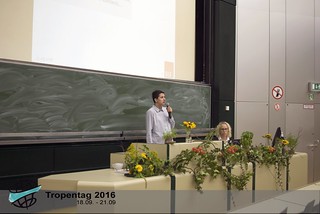Reply to comment
Toxins in Tropical Food Production
Wed, 09/21/2016 - 16:04 — BackhausDo you know what rice consumption in Nigeria and milk consumption in Kenya have in common? It’s something that both livestock and crop farmers, especially in developing countries, have to deal with: the risk of exposure to mycotoxins in food. One could hear about this topic today, last day of Tropentag 2016, in the fourth oral presentation about food security and nutrition, as well as yesterday in the third poster session about mobile dryland pastoralism. I had the chance to hear both Olusegun O. Atanda’s and Caroline Makau’s research results about such an issue on food safety, which is considered as a specific problem of tropical regions. Exposure to mycotoxins, in fact, should be as low as possible since these are genotoxic and carcinogenic.
In Kenya, aflatoxins (a type of mycotoxin produced by Aspergillus, a species of fungus) pose a safety risk in cow milk. Research revealed that this resulted from poor feed storage and on field infestation during plant growth, which then contaminated animal feeds and finally ended up in the milk. Caroline Makau stated that especially rotten maize cobs used as ingredients in on-farm formulated feeds caused this problem, and that contamination was especially high in peri-urban farms.
Olusegun Atanda’s study is mainly a call for doing more large-scale research and for stressing the need to continually monitor mycotoxin levels in rice. As it seems, this subject is worth being followed in the future.

Not completely detached from this topic is the research that has been conducted by two SLE (Centre for Rural Development) students about smallholder farmers and quality infrastructure in Ghana that looks at maize and pineapple value chains. They concluded that quality infrastructure needed to be made as more accessible for smallholder farmers, who are often facing high aflatoxin levels in their produce, amongst the others.




